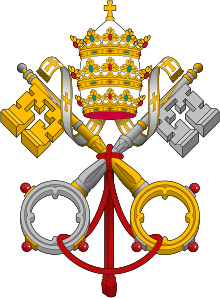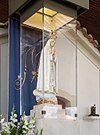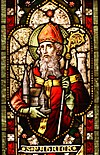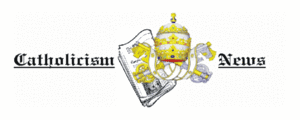Portal:Catholic Church
Introduction The Catholic Church, also known as the Roman Catholic Church, is the largest Christian church, with 1.39 billion baptized Catholics worldwide as of 2022. It is among the world's oldest and largest international institutions, and has played a prominent role in the history and development of Western civilization. The church consists of 24 sui iuris churches, including the Latin Church and 23 Eastern Catholic Churches, which comprise almost 3,500 dioceses and eparchies located around the world. The pope, who is the bishop of Rome, is the chief pastor of the church. The Diocese of Rome, known as the Holy See, is the central governing authority of the church. The administrative body of the Holy See, the Roman Curia, has its principal offices in Vatican City, a small independent city-state and enclave within the Italian capital city of Rome, of which the pope is head of state. The core beliefs of Catholicism are found in the Nicene Creed. The Catholic Church teaches that it is the one, holy, catholic and apostolic church founded by Jesus Christ in his Great Commission, that its bishops are the successors of Christ's apostles, and that the pope is the successor to Saint Peter, upon whom primacy was conferred by Jesus Christ. It maintains that it practises the original Christian faith taught by the apostles, preserving the faith infallibly through scripture and sacred tradition as authentically interpreted through the magisterium of the church. The Roman Rite and others of the Latin Church, the Eastern Catholic liturgies, and institutes such as mendicant orders, enclosed monastic orders and third orders reflect a variety of theological and spiritual emphases in the church. Of its seven sacraments, the Eucharist is the principal one, celebrated liturgically in the Mass. The church teaches that through consecration by a priest, the sacrificial bread and wine become the body and blood of Christ. The Virgin Mary is venerated as the Perpetual Virgin, Mother of God, and Queen of Heaven; she is honoured in dogmas and devotions. Catholic social teaching emphasizes voluntary support for the sick, the poor, and the afflicted through the corporal and spiritual works of mercy. The Catholic Church operates tens of thousands of Catholic schools, universities and colleges, hospitals, and orphanages around the world, and is the largest non-government provider of education and health care in the world. Among its other social services are numerous charitable and humanitarian organizations. (Full article...) Selected article
 Our Lady of Fatima (Portuguese pronunciation: [ˈfatimɐ]) is the title given to the Blessed Virgin Mary by those who believe that she appeared to three shepherd children at Fátima, Portugal on the 13th day of six consecutive months in 1917, starting on 13 May, the Fatima holiday. The title of Our Lady of the Rosary is also used in reference to the same apparition; the children related that the apparition specifically identified herself as "the Lady of the Rosary." It is also common to see a combination of these titles, i.e., Our Lady of the Rosary of Fatima (Portuguese: Nossa Senhora do Rosário de Fátima).Between May and October of 1917, three shepherd children, Lúcia Santos and her cousins Jacinta and Francisco Marto, reported visions of a luminous lady, believed to be the Virgin Mary, in the Cova da Iria fields outside the hamlet of Aljustrel, near Fatima, Portugal. The Lady appeared to the children on the 13th day of each month at approximately noon, for six straight months. The only exception was August, when the children were kidnapped by the local administrator.
Selected image
 Credit: Eadfrith, Bishop of Lindisfarne
The incipit of the Gospel of Matthew from the Lindisfarne Gospels, an illuminated Latin manuscript of the gospels of Matthew, Mark, Luke and John. The manuscript was produced in Lindisfarne in Northumbria in the late 7th century or early 8th century, and is generally regarded as the finest example of the kingdom's unique style of religious art. It is currently in the collection of the British Library. Selected biography
 Pope John Paul II (Latin: Ioannes Paulus PP. II, Italian: Giovanni Paolo II, Polish: Jan Paweł II) born [ˈkaɾɔl ˈjuzεf vɔi̯ˈtɨwa]; 18 May 1920 – 2 April 2005) reigned as the 264th Pope of the Roman Catholic Church and Sovereign of the State of the Vatican City from 16 October 1978, until his death, almost 27 years later, making his the second-longest pontificate in modern times after Pius IX's 31-year reign. He is the only Polish pope, and was the first non-Italian pope since the Dutch Adrian VI in the 1520s. He is one of only four people to have been named to the Time 100 for both the 20th century and for a year in the 21st. Canonized in 2014, he was made the patron of World Youth Day even before canonization, for 2008 in Sydney, Australia. He started those days for youth in 1986.
Did you know...

Related portalsFeast Day of June 1
Most of his works are lost, but two apologies and a dialogue did survive. The First Apology, his most well-known text, passionately defends the morality of the Christian life, and provides various ethical and philosophical arguments to convince the Roman emperor, Antoninus, to abandon the persecution of the Church. Further, he also indicates, as St. Augustine would later, regarding the "true religion" that predated Christianity, that the "seeds of Christianity" (manifestations of the Logos acting in history) actually predated Christ's incarnation. This notion allows him to claim many historical Greek philosophers (including Socrates and Plato), in whose works he was well studied, as unknowing Christians. (Full article...)
Selected quote

News
SubcategoriesTopics
The Holy Bible:
Particular Churches (grouped by liturgical rite):
Things you can do
External resourcesWikiProjectsAssociated WikimediaThe following Wikimedia Foundation sister projects provide more on this subject:
Discover Wikipedia using portals |

































